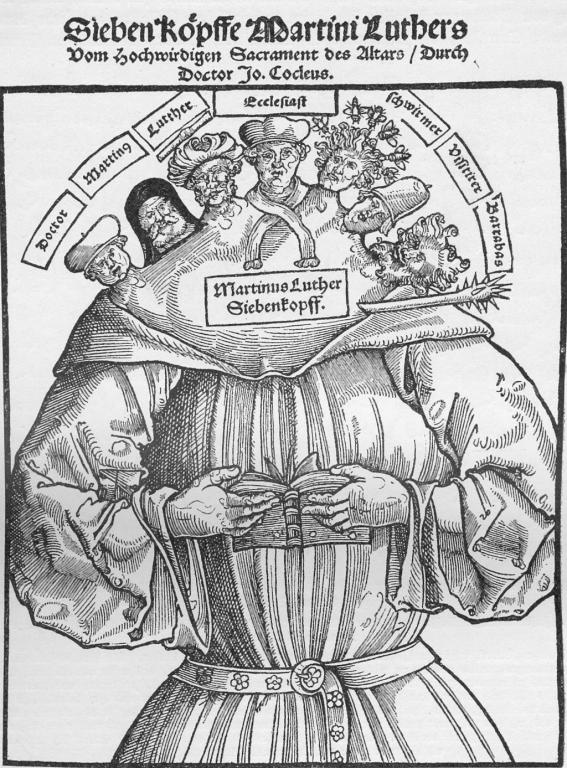The Christian historian Philip Jenkins, now on the faculty at Baylor, is one of my favorite scholars. Perhaps best known for his book The New Christendom: The Coming of Global Christianity (2002), which documents the exponential rise of Christianity in the developing world, even as it declines in the once-Christian west. But his multi-faceted scholarship also ranges from the ancient world through World War I. (See his Amazon page to see what I mean.) When I wrote about George Herbert’s poem “The Church Militant” last week, lo and behold, a useful discussion of the poem I uncovered happened to have written by Philip Jenkins!
So I always like to read his occasional posts at the Anxious Bench, a blog by various Christian historians here at Patheos. In two posts, here and here, he raises the topic of anti-Protestantism.
Prof. Jenkins says that there has been a great deal of scholarship about anti-Catholicism, but hardly any about anti-Protestantism. Even though there is a vast amount of it that deserves to be studied, from the counter-Reformation times through the 20th century, and, I would add, to today. Though such hostility–which Prof. Jenkins distinguishes from legitimate theological debate–has been toned down significantly in our more ecumenical times, you can still find it pretty easily on the internet.
There have always been more Catholics than Protestants, and the rhetoric reveals much about the history of the church and the cultures involved. If Luther taught that the Pope is the anti-Christ, Catholics were taught that Luther was the anti-Christ.
Prof. Jenkins also notes that anti-Protestantism was sometimes conflated with anti-semitism, so that the polemicists would attack “Judeo-Protestantism.” They would also insist that Protestantism leads to atheism and secularism. (This charge is also current today. See, for example, Brad Gregory’s The Unintended Reformation.) Also, I would add, immorality, since Protestants think salvation is by faith instead of works, and social disorder. Prof. Jenkins quotes an American Catholic writer who blames Protestantism for the civil war:
“Aggressive Protestantism is essentially rebellious, … its origin is the spirit of secession and revolt, … its history is but a chronicle of insurrection, and…, in short, sedition and mutiny are but fruits of the Lutheran leaven spreading under the specious name of Liberty and Independence into all the ramifications of political, social and domestic life.”
This is the converse of the line of pro-Protestant thought that ties Protestantism to the rise of liberty and individualism–seen as good things–throughout Western culture, suggesting a conflict between Protestant and Catholic values on these issues. Notice that “sedition and mutiny” here are blamed on Luther, who is presented as the exemplar of all Protestantism.
Here is where things get ironic. Prof. Jenkins also notes that Protestantism was also linked in the Catholic polemicist’s mind with the Masonic movement. But Lutherans also excoriate the Masons!
In fact, much of what the anti-Protestant writers blame on Luther–individual interpretation of the Scriptures, personal revelations from the Holy Spirit, contempt of the sacraments, indifference to doctrines, antinomianism–Luther also condemned when he saw them in his fellow Protestants!
Technically, the first “Protestants” were the Lutheran princes who protested the Emperor’s repudiation of religious toleration at the Diet of Speyer (1529). So the word, like “evangelical,” first referred to the Lutherans, but then acquired a broader meaning. Today, some confessional Lutherans reject the term, saying that “Protestant” refers to Christians who are non-sacramental. Lutherans, they say, are sacramental, like Catholics and the Orthodox, and so should not be called “Protestants.” Or “evangelical,” since that term today refers to adherents of “decision theology.”
Polemicists tend not to be careful about theological distinctions. The same can be said about Lutheran polemicists, who tend to lump Calvinists and Arminians together as “Reformed,” despite their great differences, though from a Lutheran perspective they agree in rejecting the efficacy of Baptism. Which, of course, is the issue emphasized by anti-Lutheran Protestants, who also associate Lutherans with Catholics and the Orthodox and deny that Lutherans are either “Protestant” or “evangelical.” Thus the Protestant anti-Lutherans end up agreeing with the Lutheran anti-Protestants.
I bring up all of this to set up tomorrow’s post. . . .
Illustration: Woodcut showing Luther and the Reformers as the Antichrist (16th century) by Unknown author, Public domain, via Wikimedia Commons














